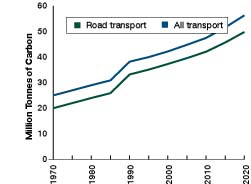The following extract is from the Government's White Paper for Transport and highlights the environmental impact of travelling by car.
The way we travel is changing our environment for the worse. The 'skyglow' from light pollution and noise from transport have changed much of our countryside. Road construction and car parking have made heavy demands on land, a finite resource. In England alone, in the second half of the 1980s an area equivalent to the size of Bristol was taken for road building and parking.

Climate change is one of the greatest environmental threats facing the world today. Globally, the balance of evidence now points to a discernible human influence on the earth's climate through the emission of greenhouse gases. In the UK, transport's share of carbon dioxide (CO2) emissions, the main greenhouse gas, has grown from around one tonne in eight in 1970 to more than one tonne in four in 1995, and is set to grow still further. Four-fifths are produced by road vehicles.
As we use cars more, we have made less use of public transport. Yet buses and trains can have distinct environmental advantages as highlighted by the Royal Commission on Environmental Pollution. Buses require less road space per seat than cars and usually emit less CO2 per occupant. Emissions of CO2 and most other pollutants are lower per tonne-kilometre for rail freight than road freight. And emissions of CO2 and most other pollutants are generally lower per passenger-kilometre for rail than for road.
The following text is taken from Reducing the University of Bristol's environmental impact - Targets for 1998/999. The document was formulated by the University's Environmental Advisory Group and has been approved by Buildings Committee and contains a series of targets on Transport and Commuting.
As one of the largest employers in the city, University staff have a significant impact on the transport problems of Bristol. It is estimated that University staff drive 5 million km to/from work every year, releasing over 700 tonnes of CO2 and 1/4 of a tonne of sulphur into the atmosphere. Staff travelling to and from work is one of the most significant environmental impacts of Bristol University. The University has recently started to look at implementing a Commuter Plan which will encourage staff to use alternative methods of transport to driving to work alone.
| Objective for 1998/1999 |
Target for 1998/1999 |
Indicator |
|---|---|---|
| Determine implementation strategy for Commuter plan |
To draw a detailed time-frame for the implementation of the Commuter Plan |
Develop and publicise |
| Undertake University-wide consultation over the proposed measures contained within the Commuter Plan |
To ensure that all staff are given the opportunity of expressing an opinion on the proposed changes |
Compilation and dissemination of data |
| Fundamental review of car parking policy |
Draw up detailed proposals for alternations to the University car park management strategy |
From 1/8/99 a new car parking permit allocation procedure will come into effect |
| Encourage more staff to use public transport |
5% more staff will use public transport to travel to work |
Analysis of staff travel data |
| Encourage more staff to cycle and walk to work |
5% more staff will walk or cycle to work |
Analysis of staff travel data |
| Perform an audit of all University owned / leased vehicles |
Collate information and abolish where possible use of leaded fuel |
Analysis of fuel purchase accounts |